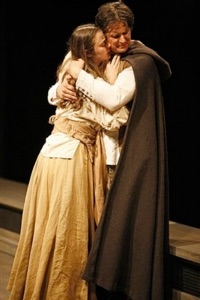Reviews 2008






✭✭✭✭✩
by John Millington Synge, directed by Douglas Beattie
Lost & Found Theatre, Registry Theatre,
Kitchener, Feb. 14-16, 2008
River Run Centre, Guelph, Feb. 21-23, 2008
"A ‘Wedding’ to Celebrate"
Lost & Found Theatre’s production of John Millington Synge’s short comedy “The Tinker’s Wedding” is a delight. The production may not be as technically accomplished as the Shaw Festival’s production in 2004, but it finds far more in the play and thus provides a richer experience. Lost & Found provide a worthy celebration of the play’s 100th anniversary.
To some extent productions of the play are inhibited by its history. Synge published the play in 1908 but it was not staged in Ireland until 1971 because of a scene late in the action where a priest is verbally and physically abused. This has led some to dismiss the work as simply an anticlerical comedy and to look no further. That’s exactly the impression the play made at the Shaw Festival as directed by Micheline Chevrier. But what you see in the play depends on how deeply you look. For Lost & Found’s production it’s clear that director Douglas Beattie has paid far more attention to Synge’s language and views the play in the context of Synge’s other works, such as his masterpiece “The Playboy of the Western World” that Beattie directed for Touchmark Theatre in Guelph in 2001.
One major consequence is that under Beattie the players are characters not caricatures as they were at the Shaw. Sarah Casey, the female companion of an itinerant tinker Michael Byrne, wants the Priest of the nearby village to marry her and Michael so they will be respectable and makes not-so-veiled threats that she may run away with another man if he does not legitimize their union. There are, however, two problems. First, the Priest will only marry the couple if they pay his fee which is higher than they can afford. Under Beattie this fact carries more weight than the beating later on. The satire is clear since Synge shows that the clergy are more interested in money than in the spiritual well-being of their fellow men. What is worse, the Priest regards the tinkers as a race beneath his dignity and beyond salvation. The second problem is Michael’s perpetually inebriated mother Mary doesn’t understand Sarah’s desire for “respectability” or the need for institutional sanctions to uphold marriage. The tinkers have always lived without such things and they are certainly not worth paying for. Mary looks back to a tradition that predates the arrival of Christianity in Ireland. Ultimately, a battle shapes up between the Priest representing the corrupt institutions of the present that hold sway over Ireland and Mary, who for good or ill represents the indomitability of the Irish people and their long pre-Christian history. In this way this deceptively simple comedy anticipates the themes that another Irish playwright, Brian Friel, will take up in his play “Translations” in 1980.
What is especially noticeable in Beattie’s production is how the characters Sarah, the Priest and Mary (Michael is almost totally passive) attempt to pursuade their interlocutors to their own way of thinking. It by clearly highlighting each of these colourful verbal tug-o-wars that Beattie brings out the subtlety of Synge comedy in a way that totally eluded Chevrier at the Shaw. Casting a woman with patrician looks like Elana Post as Sarah immediately makes clear Sarah’s desire for something better, even if it only conventional respectability. Post gives Sarah a fiery temperament but she has garnered so much sympathy from us that we have to view with some regret her final joining with Michael and Mary against the Priest since it means a relinquishment of her dreams. Synge gives Michael little to do, but Andrew Lakin draws what comedy there is from a character who waits for fates (or the women in his life) to decide what he should do. The primary disappointment is that neither has mastered the Irish dialect or characteristic Irish lilt. Alan K. Sapp is an imposing Priest, far too sure of himself and his superiority. Kathleen Sheehy gives an uproarious performance as Mary, finely ramping up her character’s dominance throughout the action. She shows us Mary’s brazen way of saying anything that will get her out of a scrap while at the same time through the merest glance showing her own surprise that her luck has not yet run out.
Eric James Ball’s set with its pretty tinker’s wagon stopped by a tree immediately conjures up the tinkers’ roving outdoor life. Beattie’s costumes capture the period and poverty of the tinker’s versus the Priest with his fine robes. Renée Brode’s lighting is instrumental in setting the mood of the piece.
The play ends with the priest uttering a loud malediction and the tinkers scattering. There’s an odd stage direction: “They rush out, leaving the Priest master of the situation.” How he is left “master” is ambiguous. Beattie solves the question by having thunder accompany the malediction with a storm breaking at its climax. Is this a result of the Priest’s curse or a coincidence? This brilliantly captures the ambiguity of the situation while at the same time evoking the kind of “magic” that may have struck awe into Ireland’s original pagans.
To fill out the evening a local group called Celtic Crossing completely with Celtic harp and dulcimer played a set of traditional Irish tunes that naturally continued the atmosphere and vitality of the play. The run of “The Tinker’s Wedding” sold out in Kitchener, so anyone seeking an evening of lively Irish comedy and music should head off to the River Run Centre Guelph for any remaining tickets.
©Christopher Hoile
Note: This review is a Stage Door exclusive.
Photo: Kathleen Sheehy, Alan K. Sapp, Elana Post and Andrew Lakin. ©Patrick D. Sheehy.
2008-02-21



The Tinker’s Wedding






